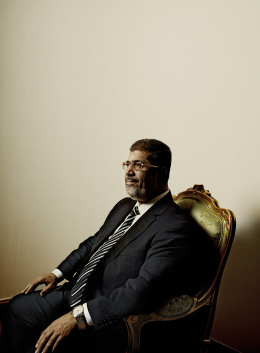In the days since President Mohamed Morsi launched his bold Thanksgiving night power grab via constitutional decree, Egypt has become accustomed to daily, dueling protests as supporters and critics of Morsi make public shows of strength. But on Monday, the country witnessed a tragic side-affect of the current unrest: dueling funerals.
In Tahrir Square, mourners commemorated the death of Gaber Salah, a 16-year old protester who died Sunday from birdshot wounds suffered days earlier in running clashes with the police. About 90 minutes away in the rural Nile Delta city of Damanhur–a longtime Muslim Brotherhood stronghold–a second set of mourners laid to rest the body of 15-year-old Islam Mahmoud, a young Brotherhood cadre who also died after being hit in the head with a rock during clashes there that left 60 others wounded.
The twin martyrs–both teenagers on opposite sides of the Egyptian ideological divide–cast an air of dread over a nation still reeling from the after-effects of Morsi’s maneuver.
With both sides calling for massive demonstrations on Tuesday, the country has been visibly bracing itself for the worst. Multiple private schools have told their students to stay home, and the U.S. embassy–just outside of Tahrir–announced it was suspending consular services for the day. While Education Minister Ibrahim Ghoneim insisted on Monday that public schools would remain open, mass absences are expected as worried parents plan to keep their children indoors.
The possibility of heavy violence in Cairo is actually fairly unlikely. The two rival protest groups have so far stayed away from one another, and police have erected concrete walls around multiple entrances to Tahrir Square–reducing the number of potential flashpoints. Furthermore, some fears were mollified late Monday night when the Muslim Brotherhood–where Morsi was a senior official before winning the presidency–announced it was cancelling its pro-Morsi rallies on Tuesday in the interest of public safety.
But outside of the capital, the situation is far more tenuous. Violent clashes between pro and anti-Morsi demonstrators have broken out in multiple cities over the past few days–often involving enraged crowds attacking the local headquarters of the Brotherhood or its offshoot Freedom and Justice Party.
Meanwhile, Morsi continues to try to manage the after-effects of his decree–which, among other things, placed all of his decisions and the status of the body drafting the new constitution outside the reach of any kind of judicial oversight. Two senior advisors to the president are known to have quit over his decision so far. And on Monday, Morsi met with a group of senior judges in order to try and resolve the dispute. Egypt’s judges revolted en masse in the wake of the decree–saying Morsi had overstepped his authority and threatening a nationwide strike. So far only a handful ofjudicial districts–each voting internally–have opted to strike.
Justice Minister Ahmed Mekki, who is handling the shuttle diplomacy between Morsi and his own judicial branch, continues to make optimistic statements about an impending compromise. But on Monday Presidential Spokesman Yasser Ali flatly stated that the constitutional decree will not be altered. Egypt’s stock market plummeted almost immediately upon opening for business Sunday morning. Trading was briefly suspended and the market ended the day with nearly a 10% drop in value. It made a modest recovery on Monday.
As the crisis drags onward, the shape of the political battle lines are coming into sharper focus. In addition to his own Muslim Brotherhood, Morsi’s main public ally in the dispute is the ultraconservative Salafist Nour Party. On the other side is a developing coalition of political players under the umbrella of the National Salvation Front. Mohammed ElBaradei, one of the front’s primary founders, has so far refused to even meet with Morsi until after he rescinds his decree.
“There is a good deal of anger, chaos, confusion. Violence is spreading to many places and state authority is starting to erode slowly,” ElBaradei told reporters on Saturday. “We hope that we can manage to do a smooth transition without plunging the country into a cycle of violence. But I don’t see this happening without Morsi rescinding all of this … There is no middle ground, no dialogue before he rescinds this declaration. There is no room for dialogue until then.”
The pressure is mounting from outside Egypt as well. On Sunday, Senator John McCain, urged president Barack Obama to be prepared to use the billions in annual U.S. aid to Egypt as a leverage point to pressure Morsi. Asked on Fox News Sunday about the establishment of an Islamist regime in Egypt, McCain replied: “I think it could be headed that way. You also could be headed back into a military takeover if things went in the wrong direction. You could also see a scenario where there is continued chaos.”
McCain’s mention of a possible military takeover brings up one of the major remaining wildcards: if the violence spirals out of control, will the army step in? So far, the military has not tipped its hand publicly. After more than a year of running the country, the army basically withdrew from public life in August after Morsi won a power struggle with the Supreme Council of the Armed Forces and sent Defense Minister Hussein Tantawi and his deputies into early retirement. But speculation has grown over the military’s stance on things and Air Force jets have been flying low over multiple areas of Cairo for several days.
via Time.com



